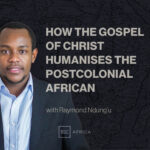Excellent Reformed and Evangelical conferences are held across Africa every year. The TGC Africa Podcast showcases select conferences to encourage and build up the local church across our continent.
This sermon was delivered at the 2023 Rooted Conference, which is hosted by GracePoint Church Kikuyu in Kenya. The conference’s theme and title was Rooted in the Cross of Christ. Each talk surveys an aspect of Christ’s death on the cross and the implications for believers today.
In this first sermon from the 2023 Rooted Conference, Daniel Gachuki walks us through Jesus’ intensely sorrowful final hours. For in Gethsemane Jesus prays to God in anguish, entreating God to take the cup from him. Yet as he draws near death, Jesus doesn’t ask for his own will to be done but God’s. Here we see one of Isaiah’s prophecies in its fullest: a man of sorrows, acquainted with grief. But why was he in anguish? How are we meant to understand Jesus’ intense agony?
Jesus’ Agony Before the Cross
Daniel argues that it wasn’t because of his looming death, which he’s been talking about for years. No. Jesus agonised over the purpose of his death, what it would mean for him to die on behalf of sinners, bearing the judgment of God.
The Father distills all the fury of hell and he puts it in this cup and he puts this cup on the lips of his Son.
Daniel puts it like this, “Is Jesus suddenly beginning to grow some cold feet? Is Jesus panicking as he thinks about his imminent death? Was Jesus afraid of death? Is this why Jesus is in agony?” Then he answers, “Listen, Jesus is not agonising over the prospect of death. Jesus is agonising because of the purpose of his death. Jesus is going to die a certain kind of death. He’s going to die a substitutionary death, a sin-atoning death, and this is made obvious by his prayer.”
Other Content On This Topic
The Wages of Sin: The Punishment of Evil at the Cross and in Hell
Suffering Christian, Remember Your Merciful and Affectionate Father
Christ Saves Us From The Penalty Of Sin
Our Glorious Christ: A Vision for Victims and Sufferers
Date: Friday, 7th April 2023
Location: 2023 Rooted Conference, GracePoint Church Kikuyu, Kenya
Transcript
Bible Reading
Good morning, church. My name is Dorothy Yukumu and I’ll be reading you our Scripture passage for today. Our scripture passage is coming from the book of Luke, chapter 22 from verse 39- 46. The book of Luke, chapter 22 from verse 39-46. For those with the church bibles, you can find it on page 1146. I will read.
“Jesus went out as usual to the Mount of Olives, and his disciples followed him. On reaching the place, he said to them, “Pray that you will not fall into temptation.” He withdrew about a stone’s throw beyond them, knelt down and prayed, “Father, if you are willing, take this cup from me; yet not my will, but yours be done.” An angel from heaven appeared to him and strengthened him. And being in anguish, he prayed more earnestly, and his sweat was like drops of blood falling to the ground.
When he rose from prayer and went back to the disciples, he found them asleep, exhausted from sorrow. “Why are you sleeping?” he asked them. “Get up and pray so that you will not fall into temptation.”” (Luke 22:39-46)
This is the word of the Lord. Thanks be to God.
Thank you so much, Dorothy. Good morning. It is a good, Good Friday morning and I can’t think of a better place to be at this morning than right here at the Rooted conference as we explore together the theme of the Cross of Christ.
Now as we sit in the glories of Good Friday, it is important for us to remember that what we call Good Friday was indeed a gruesome Friday for our Lord Jesus Christ. And yet, it was the day that has resulted in the greatest eternal good for you and I.
As we reflect on the passion story this weekend, it is my prayer that the Lord will rejuvenate all of us and rekindle our affections for him, because a God this good deserves our deepest love.
Now as we turn to this passage that has just been read to us in Luke 22, let me rush to publicly express my heartfelt gratitude to the organisers of this conference, my brothers at Grace Point Church, just want you to know that I’m really humbled and happy to be listed as a yoke fellow among you. So thank you so much for this kind invitation. Please allow me to ask for God’s help one more time and then we’ll turn to this passage.
Our Heavenly Father, as we gather here this morning, we ask that you would hydrate our souls with the gospel, that we would all be encouraged and strengthened and that we would love you the way you deserve to be loved. Lord, I resonate with these words of the Psalmist, that I will tell of your righteous deeds. I will declare your saving works even though they are beyond me.
And therefore, I ask for your help now. As I bring your Word, I pray that you would grant me clarity and concision and conviction of heart and I pray that you would give us ears to hear, to the end that we would all be built up and that Christ would be greatly exalted among us today. Please help us. In Jesus’ name we pray, amen. Amen.
Luke’s Focus on Jesus
Now Luke’s passion account is written and it is crafted with a view to especially draw attention to the supreme beauty and the compelling character of Christ. Compared to other gospel accounts, Luke’s account is pretty abbreviated, it’s very compact and it is as if Luke sorts away every other detail in order that he might help us to zoom in on Jesus.
So what we’re going to be doing today and tomorrow, Lord willing, in these expositions, is to follow Luke as he shines his light on the manifold beauty of this man we call Jesus. My dear friends, Jesus is so many things and you’re going to see that as we walk through these passages.
So we come to this passage now and it is on Thursday night of Holy Week and Jesus has already had the last supper with the 12 disciples. And in this passage, we meet Jesus in the Garden of Gethsemane. This passage that our sister Dorothy has just read for us is beyond doubt one of the most sacred passages in all Scripture and quite frankly it is beyond any preacher’s ability to unpack.
And I do not say this in any way to make excuses for my inadequacies, even though there are many! But as we see our Lord overwhelmed with grief, as we see him crushed under the prospect of the Cross, this whole thing is overpowering. The Garden of Gethsemane is a dark and dull and dreary place. This is a place of turmoil and terror for our Lord Jesus Christ and nothing in all the Bible, not even the Psalms of lament, compared to the anguish that Jesus is facing in this Garden.
By just listening to this text read, it is very easy for us to perceive the depth of the emotions. We can almost perceive the dark shadow of Golgotha casting itself upon this garden. And so, we would be right to say that Gethsemane is a prelude to Golgotha and before Jesus can surrender his body on Golgotha, he must surrender his will in Gethsemane.
But here’s the thing: in the midst of all this emotional and mental and spiritual anguish that we see in this passage, there are two things about Jesus that emerge so clearly. And I want us to see these two things. Number one: I want us to see Jesus as the concerned Shepherd. Jesus is a deeply concerned shepherd. And number two: I want us to see Jesus as a thoroughly compliant servant. He’s a thoroughly compliant servant.
Jesus is the Concerned Shepherd
So, let’s begin with the first one: Jesus is the concerned Shepherd.
Now when Jesus finished the supper, he rose and led the way to Gethsemane. Now Luke doesn’t use the word Gethsemane. He calls it the place at the Mount of Olives, but from the other accounts we know the identity of this place. It is the Garden of Gethsemane. Now, the Garden of Gethsemane was at the foot of the Mount of Olives and this name, Gethsemane, literally means oil press. And true to the meaning of that name, Jesus is going to experience a lot of pressing and pressure in this Garden.
Reading verse 39, you see that we’re told there that the disciples followed Jesus. Now Luke is the only one who uses this word “followed” to explain how they made their way to the Garden, but I believe that he was very intentional in his choice of words. He says, “they followed.” (Luke 22:39)
Now Jesus had already predicted what would happen at this Garden. Quoting Zechariah 13:7 and applying it to himself, Jesus had already foretold that on this night the shepherd would be struck and the sheep would scatter. And so when Luke says that the disciples followed, it is as if Luke wants to evoke the image of a Palestinian shepherd with his sheep.
Now I grew up looking after my grandfather’s sheep and the interesting thing in how we do shepherding around here is that the shepherd walks behind the sheep. But you need to know that in this Near Eastern culture, the Shepherd didn’t walk behind the flock – the shepherd led the flock. It was not the shepherd that would follow, it is the sheep that would follow. And so, Jesus the good, great Shepherd leads the way to Gethsemane and his sheep, his fold, his flock of 11 disciples, are on his trail.
Now this is very consistent with how Luke writes because in Luke 12:32, Jesus had already identified his disciples as “the little flock.” You remember? “Fear not, little flock, it is your father’s good will to give you the Kingdom.” So here, the great Shepherd and his little flock are headed to Gethsemane.
But I want you to see what Luke does in verse 40. Jesus knowing what would happen on this night, gives this appeal to them. He tells them, “Pray that you may not enter into temptation.” (Luke 22:40)
Now you will notice that instruction to pray is repeated in verse 46, because in verse 46, he comes to them again and tells them, “Why are you sleeping? Rise and pray that you may not enter into temptation.” (Luke 22:46)
So this account of Gethsemane is bracketed in the front end and in the back and with this appeal, this gracious appeal of Jesus, to his disciples to pray that they may not enter into temptation. Please observe that Jesus did not tell them to pray for him. He told them to pray for themselves. You see, Jesus knows that in a short while they’re going to be tempted and they’re going to be tempted to disbelieve him and to disown him and to deny him and to desert him and therefore, he urges them to be wakeful and watchful in prayer.
I want you to think with me here for a bit. Jesus knows what’s coming for him but even though Jesus knows that he’s the one who’s going to be struck – remember, he’s the shepherd, it’s not the sheep that are going to be struck, it is Jesus who will be struck – but even though he knows that this night is and will be full of turmoil and terror and anguish for him, he tells them, “Guys, it is you that I’m concerned about. I want you to watch. I want you to pray. I want you to pray for yourselves.”
Ordinarily you would expect that this is the one night that Jesus would be self-absorbed, after all, this is a difficult night for him. But that is not what Jesus is like, even on this night. Jesus exhibits this holy anxiety for his disciples. He wants his disciples to remain steadfast in their discipleship. Nothing can distract Jesus from his care for his disciples.
In the Matthan account, we are told that Jesus was sorrowful to the point of death, but it is as if Jesus interrupts his sorrow twice and he comes to his disciples and he tells them, “Please pray that you may not enter into temptation.” Now if you go back to verse 32, you will notice that Jesus had already prayed for them. It says there,”…but I have prayed for you that your faith may not fail.” (Luke 22:32) Jesus has already prayed for them but here Jesus is wanting them to pray for themselves.
And here’s a lesson for us. Jesus wants them to know and Jesus wants us to know that even though his prayers will preserve them, they will only persevere if they pray. So, Jesus preserves us but we are called to persevere by praying. This is a timeless principle. It was true then and it is true now.
You know, you and I fall into temptation when two things happen. We fall into temptation when the desire to sin intersects with an opportunity to sin. Have you ever realised that you may have the desire to sin but if you don’t have an opportunity, you haven’t sinned. Now you may have an opportunity to sin but lack the desire to sin, and hence, you won’t sin. So sin only happens when those two things come together and Jesus is telling them, “Guys, pray that you will not have the desire to sin when an opportunity is presented or at least pray that you’ll not have the opportunity to sin.”
Remember Jesus had taught them to pray like this in Luke chapter 11. That is the Lukan account of the Lord’s Prayer. He had told them pray like this:
“Lord, lead us not into temptation.” (Luke 11:4)
Now the sad thing here is that the disciples didn’t pray. You know how the story goes. We’re told in verse 46 that when he comes to them he finds them sleeping. Now Jesus had prayed for them. Jesus is praying for them but the disciples are sleeping. It’s very easy for us to get very self-righteous at this point and begin to judge these disciples harshly, but Doctor Luke (remember Luke was a medic) and he gives us a very good diagnosis for why they were sleeping, because in verse 45 we are told that he found them sleeping for sorrow. The disciples were not indifferent. The disciples were not refusing to pray. In fact, one of the Gospel accounts tells us that even Jesus said that their spirits were willing but their bodies were weak.
Luke tells us that the disciples were overwhelmed with sorrow. The sleepiness that we are seeing here was a stress induced sleepiness. You guys know that when you’re stressed, two things happen: you either sleep too much or you sleep too little. You either struggle from hypersomnia or insomnia. Now for the disciples, it was hypersomnia. They just couldn’t stay awake. They’re sleeping for sorrow.
Now it is as if all the predictions that Jesus had been making about his death – you remember Jesus has been talking about his death the whole time – and it is as if, in this moment, in Gethsemane, the reality of what is about to happen to their Lord is beginning to dawn on them. And even though they don’t quite understand the details of how that will play out, they are overwhelmed with sorrow and therefore they can’t pray for themselves.
But this is what I want you to see: I want you to see that even when the disciples couldn’t pray for themselves, even when the disciples couldn’t stay awake and watch, there is one person who’s not sleeping in this story. Their Shepherd is not sleeping. Their Shepherd is praying. Remember we are told in verse 31, “Simon, Simon, behold Satan demanded to have you… (and the “you” there is plural) that he might sift you (plural) like wheat.” (Luke 22:31)
Jesus knows that Satan desires to sift these guys like wheat. He desires to obliterate their faith and they’re not aware. But do you see what the Good Shepherd does? Even when the flock is oblivious to the danger, there is one that is more aware of the danger and he’s always doing something about it.
Dear friends, if it were all up to the disciples to withstand what the devil had in store for them, if it were all up to them, if it all depended on their prayers this night, the devil would have sifted them like wheat. But do you see what the Good Shepherd does? He’s praying and he had prayed for them. Now we know the story that in the short term they’re going to derail a little bit. They’re going to flee. They’re going to leave him. But when the story comes to the very end, we know that he restores them and that is to tell you they did not fall away finally. They would have fallen away finally save for the concern of their Shepherd.
Now I wonder if you’re seated here this morning and you agree with me on the fact that Jesus is a concerned Shepherd but, as you look around you, you wonder if he truly cares. I want to ask you a question. If, on this night, the night that Jesus was looking in the eye of death and suffering, if on this night when we are told that he’s in agony and he’s in anguish, if on the worst night of his life Jesus did not stop being concerned for his disciples, do you think that right now as Jesus is seated in eternal bliss at the right hand side of the Majesty on high, do you think Jesus will stop caring about you? He could not take away his gaze from his disciples on the darkest night of his life. How much more now when he sits enthroned in Heaven.
My friends, Jesus is a concerned Shepherd. The heart of the Shepherd is always beating for his sheep and nothing can distract Jesus from caring for his disciples. Nothing can distract Jesus from caring for you, not even agony and grief. Jesus is a concerned Shepherd.
Now, if you read the account of John of this story in John chapter 18:9, Jesus confirms that he actually did do a good job because in John 18:9 he says, “Of those whom you gave me, I have lost not one.”
Luke doesn’t want to magnify the disciples’ weak commitment. Luke wants to magnify the strong commitment of the Shepherd. This is not a story about the disciples. Jesus is the star in this story. And today, Jesus would want you and I to be reminded that as we persevere in prayer, even though sometimes they are weak prayers, even though sometimes they are intermittent prayers, even though sometimes they are inconsistent prayers, Jesus wants us to know that he is the one who keeps us. Because in the words of Hebrews 7:25, we are told, “He’s able to completely save those who draw near to God through him, since he’s always living to make intercessions for them.”
Aren’t you glad that the one who watches over Israel, that great Shepherd of your soul, never sleeps or slumbers? Do you know if you took away his gaze from you for a moment the enemy of your soul would finish you? Do you know that the reason the devil is not sifting you like wheat right now and chewing up your faith is because Jesus has not taken away his gaze from you?
This is what Luke wants us to learn: that we are weak but we have a mighty Shepherd, that we are often careless but we have a careful Shepherd, that we have a concerned Shepherd. Jesus is a concerned Shepherd.
Jesus is the Compliant Servant
But here we not only see a portrait of Jesus as a concerned Shepherd. Secondly, we see Jesus as a compliant servant. There’s something else going on here. I need to confess that it is hard for us to fully enter into the depths of the anguish of Jesus in this passage because this is simply beyond human description. The reason I’m calling him Shepherd is because if you go back to verse 27, Jesus identifies as such. He says, “But I am among you as the one who serves.” (Luke 22:27)
Again in verse 37, he identifies himself as the suffering servant of Isaiah 53. He sees himself as the fulfillment of that prophecy there. And so in the Garden of Gethsemane, it is as if Jesus begins to enter into his consumate, ultimate act of service. You know what Mark says: “The Son of Man did not come to be served but to serve, (and to do what?) and to give his life a ransom for many.” (Mark 10:45)
Jesus is beginning to enter into that role here in Gethsemane. In verse 44 we are told that he is in agony. “…being in agony he prayed more earnestly…” (Luke 22:44) In fact, if you look at verse 41, we see him there kneeling down in prayer. You need to understand that kneeling to pray was not the customary posture of Jewish men. Jewish men did not kneel when they were praying, they stood, but we are told that Jesus is kneeling down.
In fact, Matthew adds another detail. Jesus is doing more than kneeling down. In Matthew we are told that he fell on his face. The writers of the Gospel are trying to highlight the urgency and the intensity of this moment. Jesus cannot pray while standing. This is a very dire moment. Jesus can only fall on his knees and fall on his face.
The writer to the Hebrews, commenting on this idea, tells us in Hebrews 5:7 that, “During the days of Jesus’ life on earth, he offered up prayers and petitions with fervent cries and tears to the one who could save him from death, and he was heard because of his reverent submission.” (Hebrews 5:7)
Luke is giving us a graphic picture here of the suffering servant, the servant of Yahweh, the Man of Sorrows at his most sorrowful. But as you read this story, you can’t help but ask what’s going on. Why is Jesus in so much agony? Had he not been talking about his death all along? Is Jesus suddenly beginning to grow some cold feet? Is Jesus panicking as he thinks about his imminent death? Was Jesus afraid of death? Is this why Jesus is in agony?
Some of you have read or heard the story of John Rogers. Now John Rogers was one of the men who was executed because of translating the Bible during the reign of Bloody Mary in England in 1555. Now historians tell us that as John Rogers was being led to the place of his execution where he would be burnt at the stake, he passed by his 10 children and his wife and historians tell us, quote, “As he walked to the place of his death, he walked as a man walks to church on his wedding day.”
So let me ask you, do you think John Rogers was more courageous in the face of death than his Lord Jesus Christ? Not a chance! So what is going on in this moment? What is Jesus agonizing over? Listen, Jesus is not agonizing over the prospect of death. Jesus is agonizing because of the purpose of his death. Jesus is going to die a certain kind of death. He’s going to die a substitutionary death, a sin-atoning death, and this is made obvious by his prayer.
Look … with me in verse 42. He prays and he says, “Father, if you’re willing, remove this cup from me.” (Luke 22:42) What is causing Jesus all this terror? It’s right there in his prayer: it is the cup. It is this cup that he’s looking at. This is the reason Jesus is in agony, in much anguish.
So what is this cup? If you’ve read your Old Testament, you know what this cup is: it is the cup of God’s wrath and God’s judgement against sin. Isaiah 51:17 says,
“Wake yourself, wake yourself,
stand up, O Jerusalem,
you who have drunk from the hand of the Lord
the cup of his wrath,
who have drunk to the dregs
the bowl, the cup of staggering.” (Isaiah 51:17)
The prophet Jeremiah says in Jeremiah 25:15,
“Thus the Lord, the God of Israel, said to me: “Take from my hand this cup of the wine of wrath, and make all the nations to whom I send you drink it.” (Jeremiah 25:15)
Ah beloved, as Jesus contemplates drinking the cup of God’s wrath, he’s overwhelmed with anguish. And we are told here by Luke that Jesus is literally near the point of death. Did you see what he says in verse 44? We are told that his sweat became like great drops of blood falling down to the ground. Listen, this is not a metaphor; this is a medical condition. Luke is a doctor and he’s telling us that the capillaries on his forehead are bursting. And this is a potentially fatal condition. Jesus could possibly die. He’s almost deranged, he’s so emotionally drained as he thinks about the cup that awaits him.
Did you notice in verse 43 that Jesus was so spent in this moment, that the father from Heaven had to dispatch an angel to come and strengthen him. The Son of God is about to die in the Garden of Gethsemane, but because it was not in God’s plan for him to die in the garden, he sends his angel to come and nourish him and strengthen him because he can only die at Golgotha. This is not where Jesus dies. But when the Lord sends an angel to strengthen his son, this fulfils the words of Isaiah 42:1, where God says, God says, “Here is my servant, whom I uphold.” The servant of the Lord has to be upheld in this Garden.
The Cup Jesus Drinks
Beloved, I want us to turn the corner now and begin to think seriously about this cup. Do you realize that the cup that Jesus is about to drink is the cup that should have been in your hands? Do you realize that Jesus is about to do for us what we were supposed to do for ourselves?
You see, we are not even at Golgotha yet and Jesus is about to die as he thinks about the cup that he’s about to drink up. It is as if in this Garden, Jesus sees a trailer of how those things are going to unfold on the cross, how he’s going to drink the cup on that cross. What is in this cup? What does this cup mean for Jesus? What’s all the terror and all the anguish?
I want us to see four things that this cup contains. Drinking this horrible cup meant a few things for Jesus. Number one: it meant that Jesus would become sin for us. In the book of 2 Corinthians 5:21, we are told, “He who knew no sin, became sin, that we might become the righteousness of God.”
Do you know that Jesus never committed any sin? The man we are looking at here is the infinitely pure, holy, Son of God – the one who never did anything wrong against his father. But yet, he’s about to bear in his flesh the sin of all the world, the sin of all of God’s people. And as he contemplates the thought of becoming sin, it threatens to undo him.
Now the reason you and I would have a hard time understanding Jesus’s horror at this moment is because we are sinners by nature. You know, we are like a fish that doesn’t know it’s wet. We do not understand the repulsive nature of sin to an infinitely holy being. As Jesus thinks that Isaiah 53:6 is about to be fulfilled because “God will lay on him the iniquity of us all,” as Jesus thinks about how he’s going to wear our sins like a garment, one who has never come into contact with sin is beginning to shudder under the weight of that reality.
Because at the cross, the slime of the sins of paedophiles and rapists and terrorists and homosexuals and gossips and swindlers and liars and murderers and thieves and cowards and God-hating lovers of themselves, like you and I, all of that will be put on Jesus.
You see, the agony of Gethsemane reminds us that Jesus was perfect. If Jesus did not react like this in Gethsemane, it would have been sinful of him, because sin is always offensive to one that is thrice holy, infinitely holy. Jesus is not overreacting, my friends. He’s reacting the way you and I should react if we hate sin. So, whenever you’re tempted to love your sin, remember how Jesus responds and reacts to sin. It’s offensive to him. He loathes it.
But this cup did not only mean that Jesus would become sin for us, this cup meant that Jesus would be forsaken by his Father. The one who dwelt in eternal fellowship with his Father, the one who’s the apple of the Father’s eye, the beloved Son of the Father, would in some way be forsaken by his Father. As the substitute for men, Jesus would endure the wide chasm of separation. His Abba would forsake Him. Is it any wonder that on the cross, Jesus thunders that prayer of the dereliction: “My God, my God, why have you forsaken me?” (Matthew 27:46)
His Father cannot behold iniquity and here is one who has been made sin, so the Father turns his face away from his Son. In a mysterious way, the Father forsakes his Son.
But do you know, Saints, the reason the Father forsook his Son on that cross is so that you and I could own and become heir to the promise of Hebrews 13:5? “I will never leave you; I will never forsake you.”
That promise is only true because there’s one that was forsaken. God has every right to forsake sinners, but there is one that became sin and was forsaken on our behalf. That is why that promise is yours. That’s why that promise is mine for the taking. God will never forsake you, my friend.
But Jesus is not just being made sin and Jesus will not just be forsaken by the Father. Jesus, in drinking this cup, will be bearing God’s righteous wrath. He will absorb the judgement of God towards sin on our behalf.
Our brother Eugene told us this morning that sin cannot just be forgiven, sin has to be paid for. Without the shedding of blood, there’s no remission of sins and therefore, in standing as our substitute, Jesus would absorb the wrath of the Almighty. It would fall on him like a tsunami. The wrath of God would run him over like a train. And on that cross, Jesus is going to fulfill the words of Isaiah 53. He will bear our griefs and carry our sorrows. He will be stricken and smitten and afflicted. He will be pierced for our transgressions and God will lay on him the chastisement that will bring us peace. (Isaiah 53:4-5)
And because God is a just God, Jesus will atone for all of his wrath. Jesus is going to drink this cup of God’s wrath to its drags. He’s going to turn it over and say, “it is finished.” But until Jesus drinks this cup, there’s no salvation for people like you and I. Beloved, this Garden reminds us what our sins require. Do you see what your sin requires?
He would become sin. He would be forsaken by his Father. He would bear God’s wrath but drinking this cup would also mean, lastly, that Jesus would become a curse for us. Jesus would become a curse. Think about it, the forever blessed Son of God would hang on that cross and he would bear the covenantal curses of failing to obey the law of God. And as he hangs on that tree, the words of Deuteronomy would be fulfilled: “Cursed is the man who hangs on the tree”. (Deuteronomy 21:22-23)
Paul comments about this in Galatians 3:13. He tells us, “Christ redeemed us from the curse of the law by becoming a curse for us.”
Instead of receiving the blessing, that blessed blessing of Numbers Chapter 6, “The Lord bless you and keep you…” all that Jesus would hear from his Father is, “Anathema! Be cursed.” It is as if the Father would tell him, “The Lord curse you and shun you. The Lord turn his face from you and be wrathful towards you. The Lord cast you away and give you hell.”
You see, the Father distills all the fury of hell and he puts it in this cup and he puts this cup on the lips of his Son.
The Agony of Gethsemane
Now, if you take all that and you add to this cup the fact that even in the garden Jesus is being tempted by Satan to prefer a crown without a cross. If you factor in the fact that Jesus is about to be betrayed and denied and forsaken by his disciples, the anguish of Jesus in Gethsemane is beyond what you and I know.
Now, many well-meaning preachers have preached sermons about people going through their personal Gethsemanes. Listen my friends, you’ve never gone through a Gethsemane. You’ve never had to suffer as a substitute for men, for sinners.
Now please don’t hear me wrong here. I know, I know many Christians have suffered immensely. I know that even right now, some of you are going through deep suffering. But what this is meant to remind you is that the one who suffered, the one who knows anguish and agony can identify with you, but what you’re going through right now is not a Gethsemane. Only Jesus goes through a Gethsemane. This is so horrific for Jesus that Jesus is asking for an alternative. He’s asking the Father, “Father, must I drink this cup? Is there no other way to save these people?”
But I want you to see his humble compliance here in verse 42b because he says, “Nevertheless, I know what the cup entails. I know what awaits me on the cross but nevertheless not my will, but yours be done.” (See Luke 22:42b)
And do you know what God’s will was? Isaiah 53:10 tells us, “Yet it was the will of the Lord to crush him…”
God is going to do his will. God is going to answer that prayer and he’s going to crush him on that cross. Aren’t you glad that the Servant of the Lord bowed to the Father’s will because it’s the only way you and I are saved. This confirm the words of Hebrews 10:7,
“Then I said, ‘Here I am—it is written about me in the scroll—
I have come to do your will, my God.’” (Hebrews 10:7)
You see, what Luke wants us to see here in Gethsemane is not just the prayer of Jesus. He wants us to see the price that Jesus was willing to pay in order that sinners might become saints.
What it Means For Us
So as we close, let me tease out a few applications for us. Do you realize that Jesus chose to drink the cup of God’s wrath in order that you and I might forever drink the cup of grace and
blessing? Jesus chose to absorb the unmitigated wrath of God in order that you and I, dear Christian, might enjoy the unlimited love and mercy of God? Do you realize that if Jesus was not compliant in the garden there would be no hope for you, there will be no heaven for you, there will be no salvation for you? It took the compliance of God’s servant for you and I to be saved.
Oh, but what we see in Gethsemane is not just surrender, we see something else. We see triumph. We see victory here. Jesus leaves the garden a victorious man. In fact, the other accounts tell us after this moment he told his disciples, “Let us go forth because my betrayal is at hand.” (Mark 14:42)
Jesus is walking into his death. He has won the battle. His will is submitted.
There are two gardens in the Bible. There is the Garden of Gethsemane and there is the Garden of Eden. In the Garden of Eden, Adam chose to do his will and we all died. In the Garden of Gethsemane, Jesus chose to do God’s will and we all lived. In Eden, the first Adam sinned and we got a curse. In Gethsemane, the second Adam obeyed and we got the blessing. The cross is coming and as we continue in this narrative, we’re going to see Jesus drinking this cup and he’s going to drink it to its dregs.
My friends, this is the kind of Jesus you have believed in. He’s a caring shepherd. He is a concerned shepherd. He is the servant who complied and submitted fully. He obeyed where we could never have obeyed. And I want to ask you: don’t you think this servant, this Shepherd deserves your deepest love? Don’t you think he deserves your highest worship? You see, he’s not the Shepherd who only preserves his flock, he’s the one who propitiates the wrath of God on our behalf.
So we sing that song, “Man of Sorrows.” What a name for the Son of God, who came ruined sinners to reclaim. Hallelujah! What a saviour! There is no other saviour like Jesus.
Father, we thank you for Jesus. Thank you because we stand here today because he did what he did. Thank you that in the Garden of Gethsemane, he chose to obey, he chose to submit. He prayed that you would help us to grow in our love for him. And even as we sing, as we hear more sermons, as we fellowship, grant that we would be overwhelmed by this reality of this unmatched love. Blessed be your name. In Jesus’ name we pray, amen.
Dan Gachuki serves on staff at Emmanuel Baptist Church, Nairobi, Kenya. He is passionate about preaching the gospel of Christ. Daniel is married to his lovely wife Milanoi and they are raising two daughters.














